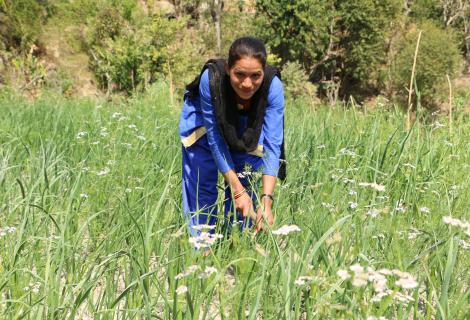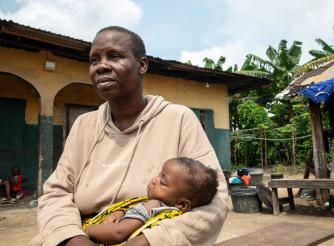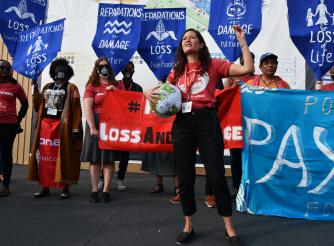ActionAid briefing: Explaining Nature-Based Solutions

Links to and sources of additional information are provided at the end of this document. You can download a PDF of this briefing here.
1. What are nature-based solutions, and what do we expect from the UN Climate Action Summit?
“Nature-based solutions” are strategies that work with nature to address the climate crisis. They can include protecting of ecosystems, or addressing agriculture’s impact on land and climate. One example of a nature-based solution to food production is agroecology, which uses natural methods to remove the need for chemical nitrogen-based fertilizers and pest control. Agroecology increases resilience to climate impacts and reduce emissions on the farm and in the production of agricultural inputs (by reducing the demand for factory-made inputs). And, because it doesn’t require costly purchases and specialized services, agroecology empowers farmers, especially women.
The UN Secretary-General’s Climate Action Summit is expected to shift attention to the importance of nature-based solutions, including sustainable food systems, in climate action.
For the Summit to succeed in scaling-up genuine nature-based solutions, initiatives announced must reflect the following:
- Agroecology must go mainstream. This is a core point in the latest Intergovernmental Panel on Climate Change (IPCC) report on Land. To secure our ability to grow food and feed ourselves in the face of climate change, and to reduce industrial agriculture’s outsize emissions footprint, food systems must move from intensive industrial crop production and synthetic nitrogen fertilisers, to agroecological approaches that work with nature instead of against it.
- Overconsumption and its drivers must be addressed in order to reduce deforestation and related pressures on ecosystems and land. For example, meat production needs to move away from intensive large-scale livestock systems that require large amounts of land for feed and grazing, and diets need to be based on less and better meat.
- The rights of indigenous peoples must be advanced in order to protect and restore the biodiverse ecosystems that form the planet’s critical carbon sinks. Studies show that securing the land tenure rights of indigenous peoples is the most effective strategy available to protect standing ecosystems.
- Expose and stop efforts to green-wash harmful business-as-usual practices – for example, monoculture tree plantations or the deceitful re-branding of industrial agriculture as “sustainable intensification” or “climate smart agriculture”. These are not solutions, they are a cover for agribusiness to continue conducting business as if the planet were a disposable commodity.
2. Why are nature-based solutions being discussed at the Summit?
The UN Secretary-General is encouraging governments to announce commitments and initiatives in 9 thematic workstream areas. Nature-based solutions represent one of these workstreams, meaning that ecosystems and agriculture are at the core of climate action.
The recent Amazon fires have put a spotlight on the importance of biodiverse ecosystems as global carbon sinks, and highlighted the threat posed to them by unsustainable agricultural practices that drive deforestation and soil erosion.
The latest IPCC Special Report on Land and Climate (released on 8 August 2019) consolidated scientific consensus that the way we approach land, food and ecosystems will be critical to our success in delivering the 1.5°C Paris Agreement goal.
In advance of the Summit, governments and non-state actors have developed a manifesto on nature-based solutions stressing that 1) climate and biodiversity are linked; 2) long-term solutions are needed; and 3) governance processes are necessary “to stop the destruction of nature and the damage caused by investments or incentives that contribute to environmental harm.”
A compendium of nature-based solutions, with over 150 case studies and best practices from governments and non-state actors including ActionAid will be released on Sunday, 22 September 2019. Concrete announcements to deliver on this potential are expected at the Summit itself.
3. Additional resources & contacts
For more information about the benefits of agroecology, see ActionAid’s case study, “Agroecology: making agriculture fit for purpose in an era of climate change” published as part of the Summit’s Nature-Based Solutions Compendium visit www.bit.ly/Actionagroecology
- ActionAid is a member of the Climate, Land, Ambition and Rights Alliance (CLARA), and co-authored the October 2018 CLARA report, “Missing Pathways to 1.5°C: the role of the land sector in ambitious climate action." https://www.climatelandambitionrightsalliance.org/report
- More examples of nature-based solutions from CLARA members are available here: https://www.climatelandambitionrightsalliance.org/case-studies
- ActionAid’s expert on climate, land, agriculture and nature-based solutions is Teresa Anderson, Climate Policy Coordinator – email: Teresa.anderson@actionaid.org / WhatsApp: +44 7984932655
- ActionAid’s media advisor at the Climate Summit in New York is Kate Donovan – email: kate.donovan@actionaid.org WhatsApp/ phone: +1 (718) 3620606- More on ActionAid at UNGA and the Climate Action Week is available at www.actionaid.org/climatejusticenow


